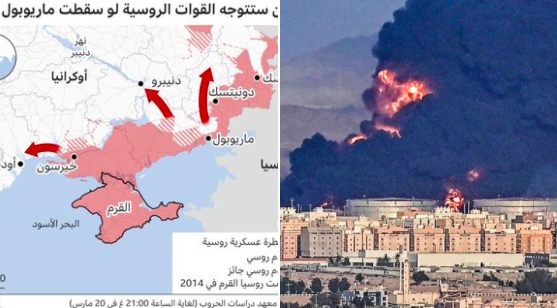OPINION: Houthi Attacks and Ukrainian Crisis—The Fall of American Leadership
by Turki AlOwerde
We find that Russia and Iran continue recklessly seeking to overthrow the international order and the leadership of the United States.
In light of the increase in Houthi terrorist attacks against civilians and civilian facilities in Saudi Arabia, and in light of the Ukrainian crisis, we may highlight several points.
Many people believe mistakenly that the international order led by the US is a matter of tactical or strategic positions as if the US chose its role. No, it’s a matter of inevitableness, as the US did not choose to build or lead, but rather as a result of the two world wars.
With the current data, China, Russia, Saudi Arabia, North Korea and Iran, combined, are unable to compete with the United States or overthrow the international order until the data changes.
Russian actions in Ukraine will undoubtedly affect the international order temporarily. Still, it is not in power to overthrow the international order, no matter how Russia insinuates otherwise.
The Russian moves in the military, energy, and currency matters are at best just an attempt to rise within the international order. Still, it may lead to results that contradict what the Russians planned in the first place.
We have two different approaches. The first includes China and Saudi Arabia, adopting a process that does not seek to challenge the international order or challenge the United States in its leadership.
On the other hand, we find that Russia and Iran continue recklessly seeking to overthrow the international order and the leadership of the United States.
The two approaches seek to create a new multipolar international order. The Chinese-Saudi approach plays within the laws of the international order. At the same time, the Russian-Iranian approach is reckless, as it does not allow to continue in the game in a targeted manner.
The truth is that the Chinese-Saudi approach is working on a sound understanding that the emergence or end of international order is linked to the inevitableness, not strategy, waiting for the opportunity, not recklessly trying to create it.
Iran is weak where its strength stems from practicing terrorism covered by the West and does not represent a dilemma for the US or the international order. Still, it is a dilemma for some US administrations that play recklessly against the inevitableness.
What threatens the US leadership in the world and its influence, is not the Chinese-Saudi axis or the Russian-Iranian axis, but it’s that some US administrations and politicians play against the inevitableness. It creates more loopholes that will undoubtedly be exploited.
The US policy of condoning or appeasing practiced by Obama-Biden administrations towards Iran against the strongest ally of the US in the Middle East is playing against the inevitableness, which led to the fall of at least three countries in the region under Russian influence.
The weak American stance towards the Iranian terrorist activities against the Saudis is eventually what gave Russia the strength to invade Ukraine and allowed the impressive achievement of OPEC+.
Turki al-Owerde is an independent Political Analyst and Commentator from Saudi Arabia. He tweets under @Turki_AlOwerde.
Disclaimer: Views expressed by writers in this section are their own and do not reflect Milli Chronicle’s point-of-view.



